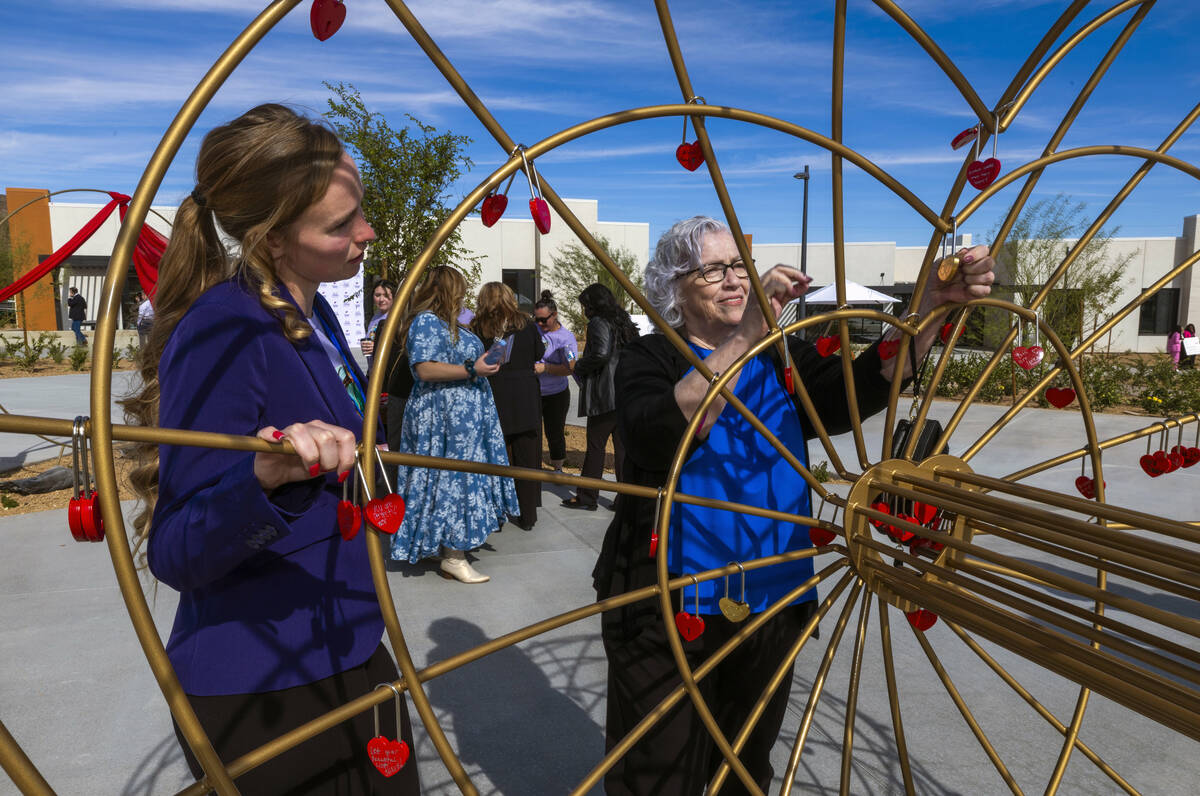A place for healing: New school, housing for victims of child sex trafficking

Amy Ayoub will never forget the brick room she was put in decades ago, which had a metal shelf attached to the wall as a bed. A victim of sex trafficking when she was younger, Ayoub was a “ward of the state” at what was then called Caliente Girls’ Training Center.
“Imagine all the children being treated like criminals when they are victims,” Ayoub said, adding that things have not changed much for young people today.
But now St. Jude’s Ranch for Children’s Healing Center for Child Victims of Sex Trafficking hopes to change that, at least for some.
The first-of-its-kind program will house and educate victims of child sex trafficking on its 10-acre campus. During a tear-filled event Wednesday morning, supporters cut a ribbon to celebrate its opening.
When licensing is complete, up to 62 people ages 13 to 18, who CEO Christine Vela said probably will come through a partnership with the Clark County Family Services Department, will live and learn on the campus as they work toward healing.
“Waking up here will be a lot different than waking up to brick walls with no windows,” Ayoub said.
She said that she and Annika Huff, a fellow survivor of trafficking who now works as a program coordinator for St. Jude’s Ranch, could only imagine what a center like this would have meant to them.
“This is a beacon of hope for those who have suffered unimaginable trauma and a symbol of resilience and strength for generations to come,” Vela said. “This is a place where it becomes safe to dream, and this is the place where hope lives,” Vela said.
A comfortable environment
The campus has a “neighborhood-style layout” with six one-story homes, each containing four to six bedrooms, therapy offices, a multipurpose building and a yoga/meditation room. A few steps through a winding, green garden is The Healing Center School, which is part of the Clark County School District.
Students will be paired with survivor advocates upon arrival. The program is designed for students to be there for around a year, though it will depend on what the child needs, according to Huff. She added that students probably will have a gap in their education just by the nature of trafficking, and the extra support will be necessary.
In addition to traditional teachers, social workers also will accompany students at school.
“It’s very tailored,” CCSD Associate Superintendent Kevin McPartlin told the Las Vegas Review-Journal, adding that in additional to traditional teachers staffed at most schools, there will be social workers who accompany the children. “It’s got to be about the whole healing process.”
The school will also offer options for students to take classes online, or otherwise adjust their schedule if they are having a particularly difficult day, according to McPartlin.
Growing need
This year alone, the Metropolitan Police Department had 123 cases of juvenile victims, six of whom were age 13, according to Capt. Michelle Tavarez.
“The growing need for services for child victims of sex trafficking, created the sense of urgency,” Vela told the Review-Journal.
Sen. Catherine Cortez Masto, who has prided herself in her work fighting against the perpetrators of sex trafficking, both during her tenure as Nevada attorney general as well as in the Senate, said that she was glad to see this center help provide a pathway for victims.
“When we come together, we can make a difference in someone’s life. It could be just one person, and that’s what it’s all about,” she said.
A long time coming
The center officially broke ground for construction in October 2022 after Vela worked for years to envision and fundraise.
It came together through a mix of state, county and private funding. In December 2021, CCSD approved $5 million toward the school.
Vela, who several people noted Wednesday was “impossible to say no to,” also thanked those who doubted the project, saying that their skepticism only fueled the determination to prove it was possible.
“The urgent need to protect each other is stronger than ever,” Vela said. “If we don’t do it, then who? And if not now, then when?”
She described the center as a new chapter of healing. More than just new buildings,“It’s a beacon of hope for those who have suffered unimaginable trauma,” Vela said.
Contact Katie Futterman at kfutterman@reviewjournal.com. Follow @ktfutts on X.